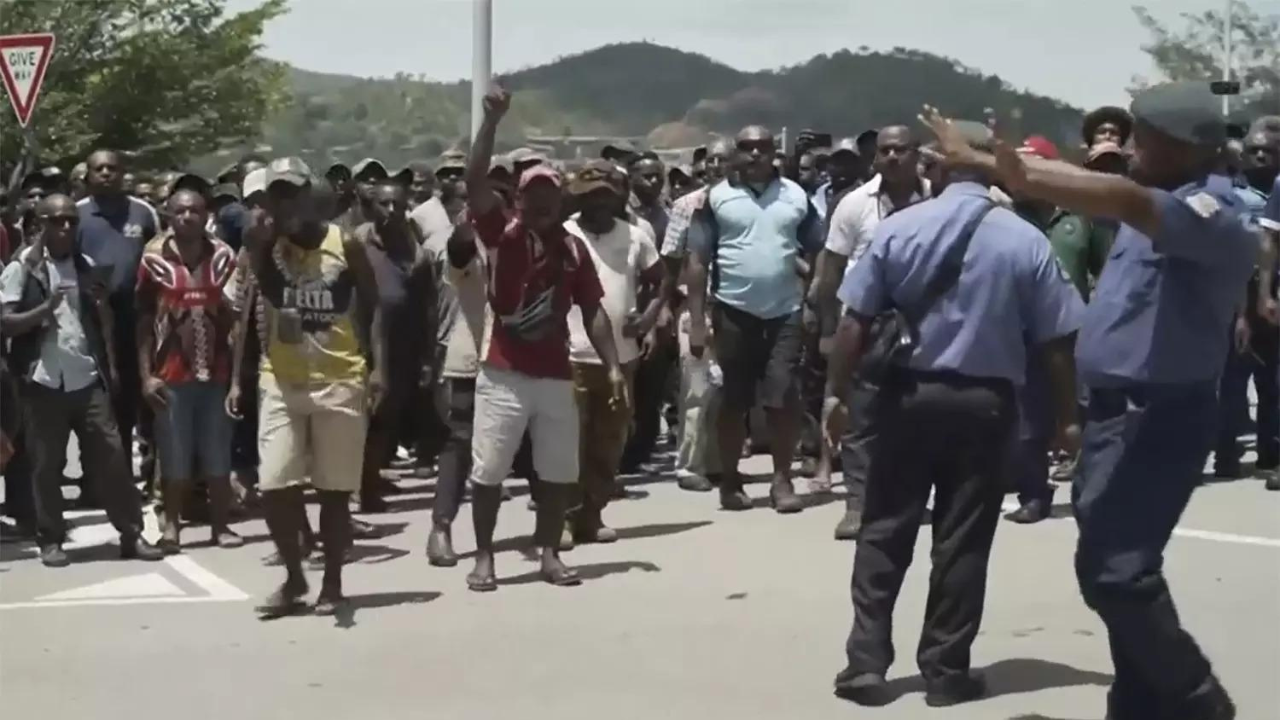NEW DELHI: Papua New Guinea‘s Prime Minister, James Marape, announced a state of emergency on Thursday, following a devastating outbreak of rioting that led to the tragic loss of 16 lives. The chaos unfolded in the Pacific island nation after a police and public sector protest over a pay dispute escalated into violent confrontations.
Sparking the unrest
The turmoil began with a protest against a pay cut, which officials attributed to an “administrative glitch.” This quickly spiraled into lawlessness. Television footage captured thousands on the streets of Port Moresby, the capital, with scenes of looting and smoke-shrouded cityscapes.
Deadly consequences
The riots claimed lives in two major cities: nine in Port Moresby and seven in Lae. These deaths, reported by the Australian state broadcaster ABC, highlight the severity of the unrest in this gold and copper-mining country.
Some TV footage showed the extent of the looting and violence, with people seen stealing from stores and causing destruction.
Government’s response
In a decisive move, Marape suspended key officials, including the chief of police and top finance and treasury bureaucrats, to conduct a thorough review. “There was evidence of organised rioting,” Marape stated, emphasizing the need to “secure democracy, [and] rule of law.”
Military intervention
Approximately 1,000 military personnel were deployed to prevent further unrest. Despite a return to relative calm, the US embassy warned that “the relative calm can change at a moment’s notice.”
Troops on patrol
Troops were visible on the streets of Port Moresby on Friday, as businesses began to reopen under the shadow of the state of emergency. The city’s residents, like economics lecturer Maho Laveil, noticed an increased police and military presence, especially after dark.
Government’s pledge
Prime Minister Marape acknowledged the security forces’ concerns and promised to address the payroll issue. However, he firmly warned against lawlessness, recalling a similar incident in 2018.
International concern
The violence also impacted foreign nationals, with several Chinese citizens injured and Chinese-owned stores targeted. Australia’s Prime Minister, Anthony Albanese, noted the close monitoring of the situation, affirming the strong relationship between the two countries.
Recovering from chaos
Friday saw a semblance of normalcy in Port Moresby, with public services resuming amid heightened security. Many Residents said they observed a significant reduction in street activity, with a strong presence of police and military maintaining order.
Sparking the unrest
The turmoil began with a protest against a pay cut, which officials attributed to an “administrative glitch.” This quickly spiraled into lawlessness. Television footage captured thousands on the streets of Port Moresby, the capital, with scenes of looting and smoke-shrouded cityscapes.
Deadly consequences
The riots claimed lives in two major cities: nine in Port Moresby and seven in Lae. These deaths, reported by the Australian state broadcaster ABC, highlight the severity of the unrest in this gold and copper-mining country.
Some TV footage showed the extent of the looting and violence, with people seen stealing from stores and causing destruction.
Government’s response
In a decisive move, Marape suspended key officials, including the chief of police and top finance and treasury bureaucrats, to conduct a thorough review. “There was evidence of organised rioting,” Marape stated, emphasizing the need to “secure democracy, [and] rule of law.”
Military intervention
Approximately 1,000 military personnel were deployed to prevent further unrest. Despite a return to relative calm, the US embassy warned that “the relative calm can change at a moment’s notice.”
Troops on patrol
Troops were visible on the streets of Port Moresby on Friday, as businesses began to reopen under the shadow of the state of emergency. The city’s residents, like economics lecturer Maho Laveil, noticed an increased police and military presence, especially after dark.
Government’s pledge
Prime Minister Marape acknowledged the security forces’ concerns and promised to address the payroll issue. However, he firmly warned against lawlessness, recalling a similar incident in 2018.
International concern
The violence also impacted foreign nationals, with several Chinese citizens injured and Chinese-owned stores targeted. Australia’s Prime Minister, Anthony Albanese, noted the close monitoring of the situation, affirming the strong relationship between the two countries.
Recovering from chaos
Friday saw a semblance of normalcy in Port Moresby, with public services resuming amid heightened security. Many Residents said they observed a significant reduction in street activity, with a strong presence of police and military maintaining order.


